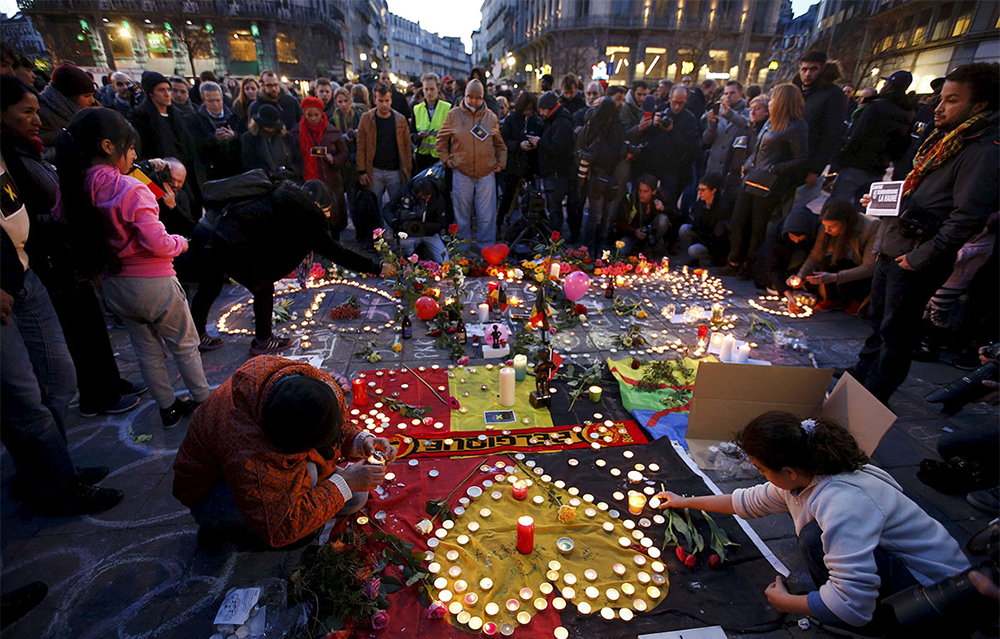
The news narrative that has been traditionally dominated by mainstream media organisations has been increasingly disrupted by the new social media platforms. This was particularly noticeable during the coverage of the shooting and killing of journalists at the Charlie Hebdo’s offices in Paris and the attacks in Brussels recently.
Introduction
In the past, editors have been the ultimate decision makers in terms of how the stories are covered, but now social media is altering that reality. Media platforms such as Facebook and Twitter are helping the power gradually shift towards the citizenry. The news content on Facebook and Twitter is reminiscent of the “good old” town hall community reporting. Town hall reporting is regarded as an early form of journalism. Emissaries of various communities attended town hall meetings, recorded everything verbatim then returned to their respective communities to give an uncensored report. This form of reporting − which some still regard as the heyday of journalism − was later corrupted by political and commercial opportunism. In the quest for increased readership, newspaper editors began to publish sensational headlines and lurid stories(1). Journalism now seems to have come full circle with more people reverting to personal accounts as their main source of news, albeit through the new social media platforms. Individual reporting that relies on personal accounts of events − often by non–journalists − is gradually becoming the main source of news. Half of journalists now say they are reliant on social media to do their work, up from a quarter in 2012(2). Through this new interactive platform, news consumers have the ability to question the editorial independence and accuracy of the reporting, and potentially spot biases. This has culminated into changes of attitudes in many newsrooms towards social media which was, until recently, seen as fringe.
Much of the criticism about how the international television news covered the recent events in Brussels was posted on social media. The comments ranged from accusing these media organisations of bias to portraying non-Europeans in a debasing light. This follows what was seen as uneven coverage of other similar events involving terrorism outside Europe. These are legitimate questions and they deserve attention and proper answers. Failure to address these concerns might compromise the integrity of the traditional media, particularly television. Furthermore it is important to answer these questions in order to promote and maintain the global consensus on the role of the media, which is to inform and educate audiences.
Why are attacks in Europe covered in this manner?
The establishment of national sponsored global news organisations such as Russia Today, CCTV, France 24 and many others have introduced new considerations when it comes to news prioritization and headlining. For example, these organisations predictably prioritize and highlight news featuring their sponsor nations. While CCTV pursues stories covering China's broader strategy, the BBC plays by somewhat different rules: under the terms of its operating licence, the World Service is not supposed to represent the British national interest, and yet it clearly is an agent of some kind of soft power.(3) Their editorial lines also unapologetically reflect certain national and political positions. Understandably Euro news continued to prioritize the Brussels attacks for the past six days, and has had it headlining all its hourly news bulletins.
The television coverage of the Brussels and Paris attacks has led to heightened media cynicism in the Middle East. The skewed and uneven reporting on important stories is resulting in growing apathy towards the traditional media. For example, the debate regarding the disproportionate airtime given to the Beirut Twin Blasts on 12 November 2015 in Lebanon over that of the 13 November 2015 Paris attacks raised serious questions. The debate seemed geographically polarized between the Global South and the North. Unfortunately two very important questions in this debate are being ignored. The debate should not focus so much on how these two stories were covered but why they were covered in this manner, and what factors were at play in the coverage of both stories. There are several factors which affect and influence television news coverage.
Accessibility
Most traditional media institutions have heavily invested in logistics in Europe. This allows them to cover stories rapidly and more easily than in other parts of the world. Technology has also enabled many media institutions, particularly in television, to beam live for longer periods of time in Europe than in other countries where satellite capabilities are sometimes still the only reliable means of broadcast. The general attitude towards journalists by governments and civil society in Europe means that there are fewer restrictions in covering breaking news. There are fewer permissions and legalities required for filming and other kinds of journalism. Developing countries tend to have very stringent media laws, and failure to adhere to them often leads to arrests. Some governments require individuals to get a licence before working in the media, using the justification that this will ensure their integrity. In most cases such licensing is used as a political tool for governments to suppress alternative, critical or diverse voices.(4) Consequently most journalists are discouraged from travelling to developing countries because of these media laws. This has resulted in a continued lack of investment of resources in the developing countries, leading to poor coverage. Furthermore most broadcast technicians are based in Europe. A lack of broadcast technicians on the ground in less developed countries results in delays before the real coverage of events can commence.
Global identity
The other important factor that must be considered is that international news organisations tend to cover news events which have a large global identity. Paris is a former colonial capital which ruled and controlled many countries and it is now regarded as the fashion capital of the world and the “city of love”. French is one of the most commonly-spoken languages in the world. French is a young, vibrant, international language. It is the only language other than English to be spoken on all five continents. In fact, among its 220 million speakers, more than 96 million live in Africa, yet it also represents the second most widely spoken native language and foreign language in Europe.(5) France and Belgium, the seat of the European parliament, are important countries with a significant global identity − it is therefore not unreasonable to assume that if something happens in France or in Belgium many in the world will be affected due to an association or attachment with those countries. This is an important factor that needs to be considered by media organisations when making decisions regarding headlining and news prioritization.
Frequency of events
Mass killings and incidences of terror in Europe are relatively infrequent, especially in comparison to other parts of the world where such events have become commonplace. This means that when they do occur, the coverage of the events is likely to be extensive. Story fatigue and audience desensitization have become common debates in many newsrooms when decisions about headlining and news prioritization are made. After all, it is a daily occurrence for newsrooms to make decisions not to show images of some of the world's realities, in part because they know that many members of their audiences do not want to see photos of violence.(6) If events happen more regularly they tend to lose their newsworthiness because they shock their audience less. The newsworthiness of an incident will decrease with every occurrence.
Empathy towards the story
Good journalism, education, socialization and politicization are key influences in the editorial decision-making processes. There was an overwhelming sense of nationalism and solidary after the Paris attacks. Most storylines included “a threat to the way of our life” statement indicating empathy towards the story, and therefore bias. The truth is, the new breed of terrorists of the Islamic State, the Lashkar-e-Taiba, the Al-Shabaab, and other Islamist groups have changed the nature of journalism with their attacks across the world. In the past the media was seen as an observer, but it is now a possible victim, with the risk of journalists or their loved ones being killed being equal to that of any other citizen.(7) However it is not only the empathy of the journalists and editors that influences decisions on the coverage, but that of the viewership too. Viewership empathy towards certain stories plays a very important role in swaying the decision of the journalists and editors because news media organisations must be in sync with their target audience if they are to remain in business. It could be argued however that socialization and politicization play greater roles than that of empathy.
Conclusion
Social media is certainly changing how we view television news coverage and indeed how news organisations prioritize and cover stories. Importantly, the recent debates have raised serious questions about the “business as usual” attitudes displayed by the international television news organisations. The criticisms leveled at them with regards to their coverage of the Paris and recent Belgium attacks are legitimate. However these criticisms must not be politicized. Instead, explanations should be provided with regards to the reasons behind certain decisions. In addition, media organisations − particularly television news − need to take into consideration the changing realities of their viewership. In the United States, viewers are watching 12 minutes less TV than they were a year ago. 2014 has seen a significantly more precipitous decline in TV viewing than any previous year, Nielsen reports.(8) Most people from the Global South are watching television, particularly in the Middle East and Africa, thanks to the advent of satellite television in those regions. Televisions are becoming more prevalent which would suggest a growth in pro-American attitudes. Yet, at the same time, privately owned and foreign media are attracting larger audiences in Africa. The growth of private broadcasters may spell the decline of flattering US images that Africans currently see on their television sets.(9) Television should then reflect this growing reality in their news coverage. This means that television news organisations should review all factors that have traditionally influenced their decisions when it comes to news coverage. Failure to conduct such a review could compromise global consensus on the impartiality of journalism. The days where the television news editors ignored viewers’ feedbacks are gone. The viewership is interactive and demands immediate response and continual education.
(1) “History of American Journalism, The 1900s,” http://history.journalism.ku.edu/1900/1900.shtml, (accessed 29 Nov 2015)
(2) “2015 Global Social Journalism Study, http://www.cision.com/us/resources/white-papers/social-journalism-study/Cision (accessed 30 Nov 2015)
(3) Chris Tryhorn, “BBC is in a soft power battle with international broadcasters,” The Guardian, http://www.theguardian.com/media/media-blog/2013/nov/13/bbc-broadcasters-tony-hall-worldwide-audience-cctv-al-jazeera, (accessed 30 Nov 2015)
(4) “Licensing of Media Workers,” Article 19, https://www.article19.org/pages/en/licensing-of-media-workers.html, (accessed 30 Nov 2015)
(5) “Why French Matters,” Rutgers University Camden, Department of Foreign Languages, https://foreignlanguages.camden.rutgers.edu/french/why-french-matters/, (accessed 30 Nov 2015)
(6) Suhasini Haidar, “Journalist of citizen?” The Hindu, http://www.thehindu.com/opinion/columns/diplomatic-licence-journalist-or-citizen/article7916322.ece, (accessed 30 Nov 2015)
(7) Susan Moeller, “Compassion Fatigue about Syria already?” The Huffington Post, http://www.huffingtonpost.com/susan-moeller/why-you-need-to-look-at-t_b_3803383.html, (accessed 30 Nov 2015)
(8) Victor Luckerson, “Fewer People Than Ever Are Watching TV,” Time, 3 December 20 14, http://time.com/3615387/tv-viewership-declining-nielsen/
(9) United States Congress, House Committee on Foreign Affairs, African Opinion on US Policies, Values and People, page 25
